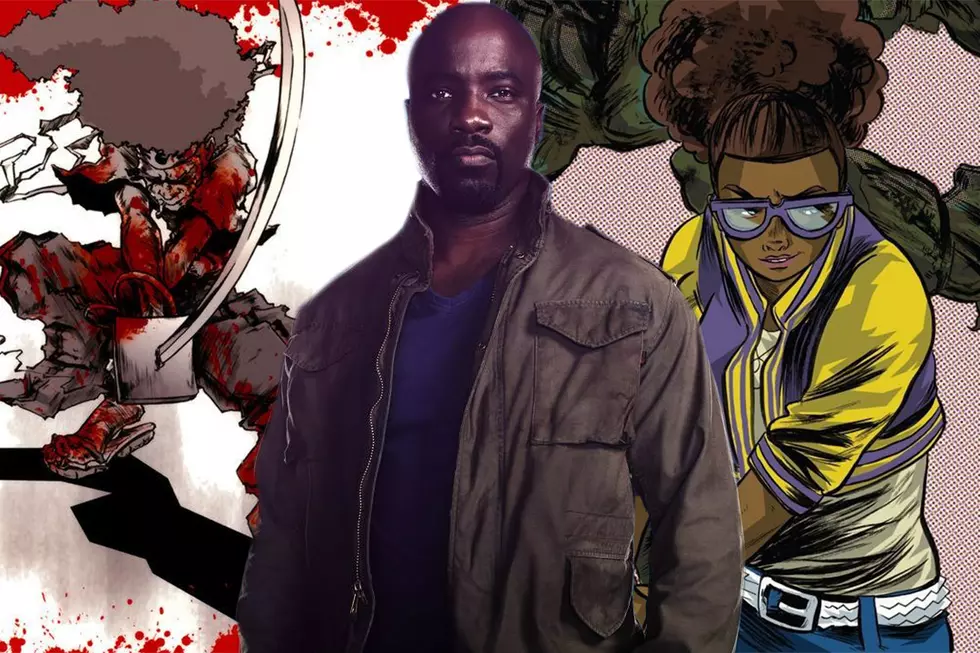![‘The Guild’ #1 Goes to the Heart of the Web Series [Review]](http://townsquare.media/site/622/files/2010/03/the-guild-comic-cover.jpg?w=980&q=75)
‘The Guild’ #1 Goes to the Heart of the Web Series [Review]

This week Dark Horse Comics releases the first issue of "The Guild," the comic spin-off of the award winning web show about a group of MMORPG players whose interactions range from heartwarmingly friendly to awkwardly dysfunctional. Felicia Day, who created the series -- and portrays main character Cyd Sherman/Codex -- is writing the comic, with artist Jim Rugg providing the interior art. Day's involvement with the book ensures the story, a prequel that explains how Cyd first made her choice to play The Game, keeps the personal tone of affectionate satire that'll be instantly familiar to fans of the show.
"The Guild" series has both celebrated the communities of people that are brought together by Massively Multiplayer Online Role-Playing Games, while at the same time delivering jabs (both subtle and not-so-subtle) at the idea of people avoiding real life social interaction to look for that interaction online. While video games were once a place to anonymously escape from the cares and troubles of the real world, leaps in technology now have players communicating with fellow escapists. They make new friends and often end up creating exactly the sort of complicated social dramas they profess to want to run away from in order to engage in the far simpler activity of sticking a pointy metal thing into a fire-breathing dragon.Day has taken on a slightly darker angle here, partially because the story here focuses on Cyd as she approaches a low point in her life, and partially because the comedic elements of the show's fast-paced, gamer-in-joke-laced banter don't play out quite the same in a twenty-two page comic as they do in a web series delivered in six-minute episodes. But it's still good, it still makes me laugh and at the same time it finds the emotional core in what could otherwise be a premise played purely for jokes.
While the web series is more concerned with how the characters' search for a fantasy world ends up shaping their lives in the real world, the comic -- at least in its premiere issue -- is more concerned with examining the events in the real world that inspire someone to seek out escapism in the first place. We're introduced to Cyd, who has a not-so-terrible job playing violin in an orchestra. She worships her boyfriend, Trevor, a former fellow orchestra member who's now started his own rock band, where Cyd has been drafted into doing a lot of the organizational grunt work. But she can't shake the feeling that she's waiting around for something to make her happy and has no idea what it will be. And, as she tells her therapist, she's increasingly afraid that she'll end up still being in exactly the same place in her life decades from now, still waiting for something that's never arrived.

So on a whim, she decides to try out on an online role-playing game. The box sits around waiting for her until an absolutely heartbreaking scene later in the book where she turns to the game as a world where she can escape, a place where someone can reinvent their identity. "You can be whoever you want," she tells herself. But then she goes and, after cycling through a number of possible character avatars, creates one that looks exactly like a virtual stand-in for herself. It's not her identity that Cyd is running away from, it's everything else in her world. Day conveys this in a sequence that relies on minimal narration and the impact is impressive. Rugg's artwork complements it beautifully. Particularly effective is the change in tone between the real world, depicted with its harsh, definite lines, and the fantasy world with its brighter, blended colors and appearance straight out of a lush fantasy landscape painting. Getting the look of the two worlds right only further emphasizes Cyd's excitement at finding a place where she can run away from the concerns of her real life and where obstacles are dealt with by hitting things until they die in a bloody mess and leave rewards behind.
"The Guild" is a series that Day created and doesn't hesitate to describe as "my baby." And the comic, like the web show, bears the mark of a creator for whom the work is a labor of love. A lot of care has been put into this book, and with this issue being less of an ensemble piece than the show it ends up being even more of a personal work for Day. It hits all the right notes, being equally effective when it chooses to be funny and when it chooses to be sad. Fans of the show should enjoy it, in particular for the first glimpses into the fantasy world of The Game, which has never been depicted in the web series itself. And for those of you unwilling to watch three seasons of a show available entirely for free on the web but whose interest is piqued by a comic you'll have to pay for, it's a good introduction to the setting and an interesting examination of escapism, a topic that even comics fans who aren't gamers may find themselves relating to.
More From ComicsAlliance
![I’m A Maniac For Flavour! ‘All-Time Comics’ Taps Into Old-Time Ad Nostalgia [Exclusive]](http://townsquare.media/site/622/files/2017/03/atcads_featured1.jpg?w=980&q=75)








